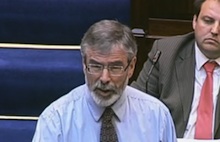
The Dublin government’s futile attempts to secure relief from its budget and banking crises continued this week in the face of increasingly arrogant debt repayment demands by European Union authority figures.
By the end of the month, the 26-County state faces a payment of 3.1 billion euros toward the debts of the fraudulent Anglo-Irish Bank. It is the second annual repayment of a debt the government is being required to pay by European officials to bolster the EU banking system.
Conflicting signals have emerged from the Fine Gael/Labour coalition government over its desire to renegotiate the 47.4 billion euro of promissory notes (with interest) agreed by the last government.
Despite the imposition of a controversial new household tax on the Irish public, also due by the end of the month, the 26 County state is struggling to meet the 3.1 billion euro demand.
Both the European Commission and the European Central Bank have haughtily dismissed suggestions by Minister for Finance Michael Noonan that he was negotiating to reschedule the payment. Noonan had said “it was a long way to the end of the month” and that “nothing was ruled in or out”.
But a spokesperson for the ECB said the government should instead cut social welfare payments. And asked whether any flexibility could be afforded to Ireland on the debt, EU economics commissioner Olli Rehn said the principle in European legal and historical tradition “is, in Latin - pacta sunt servanda - respect your commitments and obligations”.
The bank debt question is highly sensitive for the government given the upcoming referendum on Europe’s new fiscal austerity treaty. In recent days, Taoiseach Enda Kenny and Tanaiste Eamon Gilmore have rejected claims by Minister for Social Protection Joan Burton that Ireland should be given a concession on the debt to boost support for the referendum.
Sinn Féin’s Gerry Adams urged the Taoiseach to ‘stand up’ against financial demands, in the same manner as governments in Spain (and previously, Iceland and Greece) have successfully done.
“Depending on which Minister is talking, people have a sense that the Government is, or is not, in negotiation at this time,” Mr Adams said. He warned that Ireland’s great-great-grandchildren would have to pay the debt, as opposed to (just) grandchildren and great-grandchildren.
He also urged the Taoiseach to “follow the lead of the Spanish government, stand up for the interests of Irish citizens and refuse to pay this promissory note”, pointing to the flexibility Spain had secured earlier this week in its budget deficit targets through negotiations with the European authorities on the proposed austerity treaty.
“This follows from the Spanish prime minister’s rejection of the austerity and deficit targets set by the EU,” he said.
“Does the Spanish government’s unilateral decision and the finance ministers’ compromise not make a nonsense of this austerity treaty? Is it not clear from this one example that the deficit demands being made in the treaty are impractical?”
Mr Adams accused the Taoiseach and the Labour Party of having an entirely different approach to other governments.
The had “kowtowed to their masters in the EU and assured them that they will not seek any write-off of the totally unfair, unsustainable and unacceptable debt that has been foisted on our people by the Government, and by the previous government of which Deputy Micheal Martin was a member”.
The government had insisted it had campaigned for months to restructure the EU-backed arrangement under which Dublin is recapitalising the former Anglo Irish Bank and the former Irish Nationwide Building Society with expensive IOUs known as promissory notes.
But as he left Brussels yesterday after two days of talks on the financial crisis, Mr Noonan was forced to admit the Irish bank debt question had not featured on the agenda when EU finance ministers gathered. He also said he did not expect the issue would be on the table when the ministers next meet in Copenhagen at the end of this month.
![[Irish Republican News]](https://republican-news.org/graphics/title_gifs/rn.gif)
![[Irish Republican News]](https://republican-news.org/graphics/title_gifs/harp.gif)

